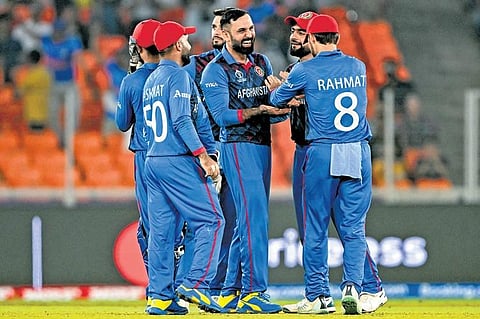

BENGALURU: The year is 2004. Wisden, cricket’s bible, are celebrating Ricky Ponting as their ‘Leading Cricketer in the World’. In the magazine’s ‘Round the World’ section, a small news item captures the very essence of a war-torn country making its way up the sport’s ranks.
“Allah Dad Noori (a former refugee who formed the Afghanistan Cricket Federation) was playing one day in Kabul when a young man walked by carrying an AK47, watched for a while before being invited to join,” Wisden had noted. “Afterwards, he asked if he could play next time. When he returned, he was without the rifle. ‘Where’s your AK47?’, asked Noori. ‘Oh, I don’t need that’, the youth replied. ‘I’m playing cricket’.”
Taj Malik, the country’s then coach, had seen this enthusiasm. “Taj set up a team in the Kacha Gari refugee camp,” according to Second XI: Cricket in its Outposts, a book on cricket and how its played outside the elite. “Mohammad Nabi, Asghar Stanikzai, Dawlat Zadran and Shapoor Zadran all played together at a camp in Peshawar.”
Nabi stands as a symbol of what they have been through. It’s taken them over 20 years of pain and heartache but they are no longer in the shadows. At this World Cup alone, they have beaten four former world champions. They almost took down a five-time champions, Australia. In a story like this, there’s always bound to be pain. The small but growing Afghanistan cricketing community woke up one morning in August 2008 to realise one of their own had been killed by US-led coalition forces. “On 27 August 2008, American forces raided the home of a former player, Rahmat Wali, after receiving a tip-off and shot him dead at the age of 28,” per Second XI in its chapter on Afghanistan. “Wali was suspected of being an IED facilitator.”
It’s 15 years and two-and-a-half months removed from that incident but it’s hard for the fraternity to let time do its thing. So, in May 2023, the Afghanistan Cricket Board, launched the ‘Rahmat Wali Emerging Cup’. The name of the Cup is a reminder of the death and devastation the country has had to face. If cricket has been a balm, that balm has frequently been played in the backdrop of bombs, deaths and political turmoil.
While it’s impossible not to reference Afghanistan’s rise without talking about these deaths, the 15 men who crisscrossed India are a supremely confident bunch capable of beating the best. The modern framing, then, ought to be divorced from the past. If the presence of Nabi is a reminder of where they were once, the likes of Rashid Khan, Ibrahim Zadran and Rahmanullah Gurbaz is evidence of what they are. Of what they can be if they continue to produce cricketers like this.
While the hedonistic Gurbaz has been hit and miss, Ibrahim registered the country’s first century at the World Cup against Australia. Zadran and Gurbaz also stand for the country’s growing nous in the batting department. Ever since they began to dance with the elite, they have had bowlers capable of winning them games. At this World Cup, their batters have shone through. Crucially, they are all different kinds of batters. Gurbaz is capable of launching it in the powerplay. Zadran is a more measured batter, capable of batting deep. Skipper Hashmatullah Shahidi is the glue in the middle-order. All-rounder Azmatullah Omarzai, who top-scored with an unbeaten 97 against South Africa, can provide the fireworks at the death with Rashid.
All this is proof that the team is primed for the next stage in the development process. That process may well be on display at the 2025 edition of the Champions Trophy. If it takes place in Pakistan, a sort of spiritual home of Afghanistan cricket, they may well find that extra motivation to go deep into the tournament.
Lesli Knott is fairly intimate with the team’s rise. A film she co-directed in 2010, ‘Out of the Ashes’, was one of the earliest pieces of art that informed the wider world about the country’s rise up the ICC ranks. “When I started filming the documentary, I had already been living in Afghanistan for 4 years,” she tells this daily. “When I arrived in 2004, I was struck by the beauty of the land and also the immense hospitality of the people. It wasn’t just the hospitality but their humour, spirit and resilience.
‘Out of the Ashes’ was the first documentary I made, and we were compelled to follow the team as they embarked on their first steps on the ICC ladder. Trying to win Division 5 in Jersey, playing alongside teams like America, Jersey and Vanuatu, we witnessed how that spirit drove them. We started filming with them in Kabul, and they gave us full access to their journey. Their facilities were absolutely basic, but it is an important reminder that it’s not what you have but instead of where you see yourself being.”
The idea to film the team came after reading an article that had appeared in the London Times. She called Taj and the motion for the documentary was set in motion. Knott, a Canadian, knew nothing about the game. But she didn’t need to. The movie wasn’t about cricket. It was about the power of dreams. “I am Canadian and knew nothing about cricket when I started. But with each division win, I learned more and more. The film isn’t just about cricket, but about the power of dreams, and the desire to do something for your country. As refugees in Pakistan, they wanted to play under their flag. They achieved that, and more so — they paved the way for the team that is currently playing against Australia today (Tuesday). Cricket in Afghanistan exploded after their meteoric rise.”
That rise is set to continue.